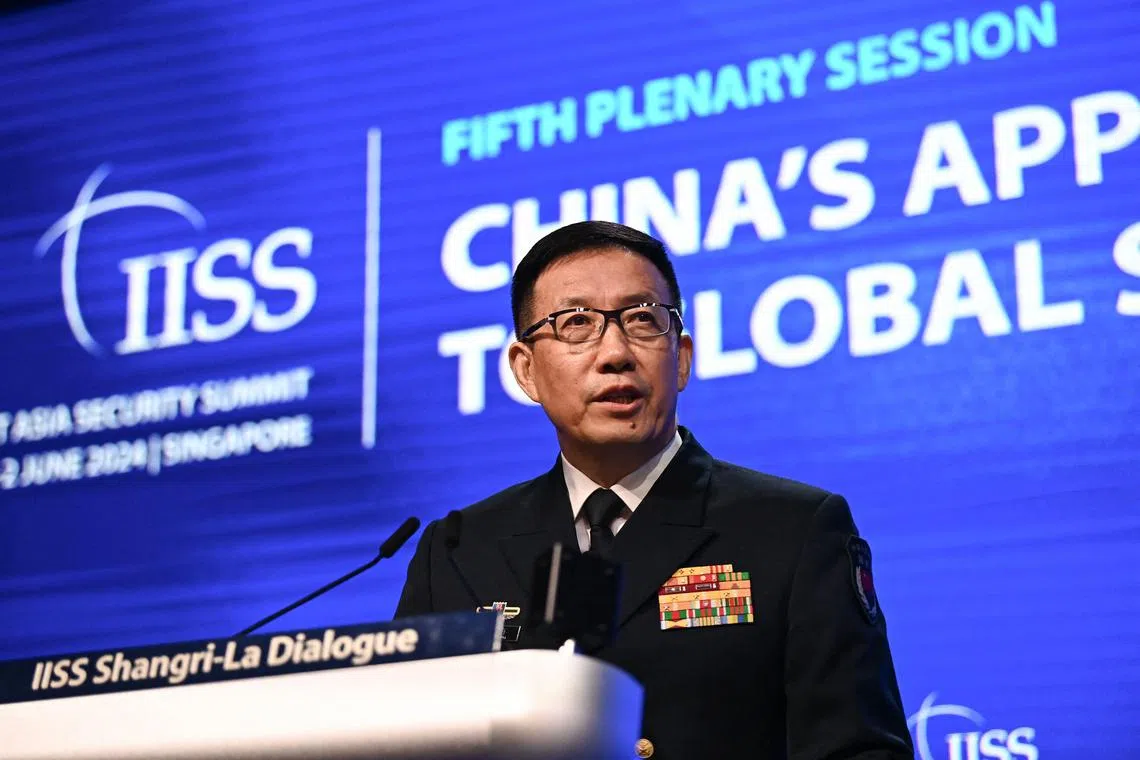Shangri-La Dialogue 2025
China will not send its defence minister to Shangri-La Dialogue for the first time since 2019
Sign up now: Get insights on Asia's fast-moving developments

Chinese Defence Minister Dong Jun speaking at the 21st Shangri-La Dialogue in Singapore on June 2, 2024.
PHOTO: AFP
BEIJING – China will not send Defence Minister Dong Jun to the Shangri-La Dialogue (SLD) in Singapore, in a departure from Beijing’s high-level representation at the annual security forum in recent years.
Instead, China will send a People’s Liberation Army National Defence University delegation, China’s Ministry of Defence announced on May 29, just a day before the forum kicks off.
This will be the first time since 2019 that China has not sent its defence minister to the forum, where China’s views on issues such as Taiwan and the South China Sea are closely watched.
This means that China cannot hold bilateral meetings at the ministerial level with other countries such as the United States.
The forum is being held from May 30 to June 1 in 2025.
At the 2024 forum, Admiral Dong met his then US counterpart Lloyd Austin for the first time
This year, the new administration of US President Donald Trump will be represented by Defence Secretary Pete Hegseth.
China’s participation is among the highlights of the SLD. It is one of the few occasions where defence officials, academics and journalists from other countries can pose questions directly to a senior member of China’s defence establishment.
Other countries also find value at the SLD in being able to hold bilateral meetings with the Chinese defence minister.
The annual forum began in 2002, but China sent its defence minister to the dialogue for the first time only in 2011.
Between 2012 and 2018, its delegation was led by a senior official either from the Academy of Military Science or the Central Military Commission’s Joint Staff Department, until its then defence minister, General Wei Fenghe, did so in 2019.
Since then, China has sent defence ministers to defend its views on security issues and hobnob with their counterparts, except in 2020 and 2021, when the SLD was not held due to the Covid-19 pandemic.
Dr William Choong, a senior fellow at the ISEAS – Yusof Ishak Institute in Singapore who has written extensively on the SLD, believes it is a missed opportunity for China to not send its defence minister this time around, given diminished perceptions in the region of the US as a reliable partner and ally.
“The Americans have scored an own goal with its ‘Liberation Day’ tariffs,” he told The Straits Times.
He was referring to the across-the-board import tariffs the US imposed in April
The Trump administration has also not said anything about an overarching vision for Asia or the Indo-Pacific region, apart from when Mr Hegseth visited Japan and the Philippines, he noted.
As for possible reasons for the defence minister’s absence, the most important factor would be whether Adm Dong is cleared by the Communist Party of China (CPC) to attend the SLD, Dr Choong added.
Adm Dong, who was appointed defence minister in December 2023, was reported to have faced investigations
Also, unlike his predecessors, Adm Dong has not been promoted to the Central Military Commission, the country’s top military decision-making body headed by Mr Xi Jinping. Adm Dong had missed a key window of opportunity for promotion in July 2024, when the CPC held a major meeting.
Observers have speculated whether this means his position is not fully assured.
Another possible reason is how China could view the SLD, organised by the London-based International Institute for Strategic Studies think-tank, as less than conducive to delivering its narrative.
Dr Choong said: “To the Chinese, Shangri-La is basically – to turn the Chinese phrase on its head – a forum with US or Western characteristics, in the sense that there is freedom of speech and open debate and questions.”
China prefers to give a prepared message, and does not want questions to distract from that, he said. “But at Shangri-La, you get academics and journalists asking very direct and provocative questions of the defence minister.”
China is trying to build the profile of its own Beijing Xiangshan Forum, founded in 2006, which usually takes place near the end of the year. For the first time, in April 2025, it held a preparatory meeting for Xiangshan, called the Navigator Meeting.
The SLD also has a preparatory meeting each year, known as the Sherpa Meeting, which typically takes place in Singapore in January.
While it is impossible to know for sure, China could be getting governments to attend the Xiangshan forum, said Associate Professor Chong Ja Ian of the National University of Singapore, who specialises in Chinese foreign policy.
It could also be because it does not want to engage in high-level bilateral talks with others, such as the US, at this time, he added.
“The PRC delegation had in the past complained that SLD is a venue where other governments press it, perhaps unfairly,” he said, referring to China’s formal name the People’s Republic of China.
“Non-attendance may also mean that the PRC has less of a voice to amplify its position. However, a more junior representation may also free up the PRC delegation to be more robust in their responses without direct attribution to their top leaders,” he said.
Lim Min Zhang is China correspondent at The Straits Times. He has an interest in Chinese politics, technology, defence and foreign policies.



